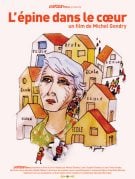In all fairness to The Thorn in the Heart, Michel Gondry's home movies are more interesting than most peoples'. The French director famous for his sense of visual style and whimsy didn't force his aunt to wear elaborate costumes or crawl through cluttered landscapes when he made a documentary about her, but Gondry did film his aunt Suzette with the same generous spirit and and adventure that have marked his other films. Clearly he sees something in this woman that distinguishes her from every other retired French schoolteacher; too bad he was unable to share that passionate interest with the rest of us.
The film opens with Suzette telling a story about her dead husband to her collected family members, a story they find gut-bustingly hilarious but which leaves out the audience entirely-- we don't know the dead husband, and never will. So it goes for pretty much the rest of the film, as Gondry stays far too close to the subject of his film to step back and provide even a smidgen of context for the audience. He follows Suzette as she revisits the eight rural French schools where she taught in the 60s and 70s, but we're never told why she moved from place to place so often. At various points other family members, including Gondry's teenage son, show up, but there's no family tree or even titles to tell us their names.
What emerges halfway through the film is the actual story and the source of the title-- Suzette's relationship with her son, Jean-Yves, who is estranged from her both because he is gay and because she failed to share the news of his father's death until several days after. The tension between them is palpable when they share the screen, and when Gondry occasionally probes them separately to discuss their relationship, the simple insight can be heartbreaking. But the moment Suzette begins to cry on camera, Gondry backs off and says "I'm being mean"; the simple fact of being a nephew makes him unable to wring out the true story of the movie.
Which leaves us with a rambling, confusing French countryside travelogue, peppered with moments of whimsy and magical realism-- children dancing in front of a green screen, an antique toy train rolling by, old Betamax footage of Gondry as a child-- but mostly isolating, particularly for audiences not already interested in Gondry himself. Gondry's goal in making the film, in telling the story about the kind of person who isn't normally seen at the movies, is admirable, but he may have been better off exploring a person he didn't know, so the audience could learn about that person right alongside him. While Gondry's other films have infused the entire theater with a sense of magic and adventure, The Thorn in the Heart feels more like eating your spinach for the sake of a relative you don't even know.
Your Daily Blend of Entertainment News
Staff Writer at CinemaBlend


